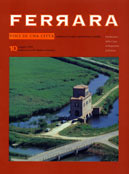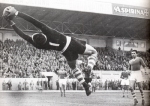Ma se appassionato non era, e mi aveva rivolto la domanda tanto per riempire una pausa, lo sconcerto era molto maggiore.
Spal? Aveva capito bene? Cosa significava quel misterioso monosillabo? Un diminutivo? Una sigla? E io, lì, a spiegare che si trattava, appunto, di una sigla: più precisamente dell'acrostico di Società Polisportiva Ars et Labor, la squadra di calcio di Ferrara fondata nel lontano 1907, ai tempi dei giocatori con i calzoncini al ginocchio e i baffoni a manubrio.
Incomprensioni a parte, il fatto che io, qui a Milano, mi interessassi molto più alle sorti della Spal che a quelle del Milan o dell'Inter, corrisponde perfettamente a verità.
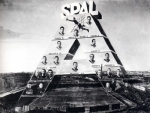 Una passione, la mia; spuntò quando ero ancora alle elementari di piazza Ariostea, nei tardi anni Venti, e il campo da gioco della Spal, nella vecchia piazza d'Armi, era ancora delimitato da una barriera di grigie assi di legno. Mai messo il naso in quel recinto, ma sapevo benissimo che lì, ogni quindici giorni, si esibiva la Spal, trascinata dal suo leggendario capitano, Abdon Sgarbi, destinato per la sua bravura a passare, di lì a poco, nelle fila del Milan. Mai visto in faccia, quel celebre centromediano, anzi centerhalf, come si diceva allora; ma io, per quel suo ruolo, e soprattutto per quel suo nome insolito, Abdon, lo immaginavo alto e potente come un monumento, qualcosa come il Colosso di Rodi.
Una passione, la mia; spuntò quando ero ancora alle elementari di piazza Ariostea, nei tardi anni Venti, e il campo da gioco della Spal, nella vecchia piazza d'Armi, era ancora delimitato da una barriera di grigie assi di legno. Mai messo il naso in quel recinto, ma sapevo benissimo che lì, ogni quindici giorni, si esibiva la Spal, trascinata dal suo leggendario capitano, Abdon Sgarbi, destinato per la sua bravura a passare, di lì a poco, nelle fila del Milan. Mai visto in faccia, quel celebre centromediano, anzi centerhalf, come si diceva allora; ma io, per quel suo ruolo, e soprattutto per quel suo nome insolito, Abdon, lo immaginavo alto e potente come un monumento, qualcosa come il Colosso di Rodi.
Quando, a undici anni, in prima ginnasio, potei finalmente assistere alla prima partita ufficiale, lo stadio aveva già la sua brava cinta in cemento e la sua nuova tribuna. Sotto quella tribuna, nei posti migliori, entrai gratis perché in compagnia di un amico della mia età, Riccardo Roncaglia, futuro validissimo giornalista sportivo, nonché figlio del presidente ferrarese della SIAE, che ci concesse, e continuò a concederci per tutto il campionato, le due tessere a libero ingresso a sua disposizione.
 In quella partita, per me una specie di iniziazione, la Spal battè la Serenissima - così si chiamava allora la squadra di Venezia - con un punteggio clamoroso: cinque a uno o anche più, non ricordo bene. Fu quella vittoria trionfale ad accendere in me una passione che doveva protrarsi negli anni fino a tutt'oggi? Fatto sta che, sempre in tribuna con Riccardo Roncaglia, assistei a tutte le partite di quel campionato, sgolandomi a gridare «Alé, alé, Spal!» con tanta forza da rimanere rauco o addirittura afono per un paio di giorni.
In quella partita, per me una specie di iniziazione, la Spal battè la Serenissima - così si chiamava allora la squadra di Venezia - con un punteggio clamoroso: cinque a uno o anche più, non ricordo bene. Fu quella vittoria trionfale ad accendere in me una passione che doveva protrarsi negli anni fino a tutt'oggi? Fatto sta che, sempre in tribuna con Riccardo Roncaglia, assistei a tutte le partite di quel campionato, sgolandomi a gridare «Alé, alé, Spal!» con tanta forza da rimanere rauco o addirittura afono per un paio di giorni.
Di quella squadra ricordo il centrattacco Romani, un atleta dai corti capelli neri e dallo sguardo bizantino che, di lì a poco, passò, come Sgarbi, al Milan; l'ala sinistra, Barbieri; il portiere, Caselli.
Ma ricordo soprattutto il cronista sportivo del Corriere Padano, Antonio Boari, che guardavo con grande soggezione, quasi fosse l'Unto del Signore. Il lunedì leggevo avidamente le sue cronache; alcuni suoi brani li imparavo addirittura a memoria, né più né meno de versi pascoliani di Valentino o di quelli di Giacomo Zanella su La conchiglia fossile. L'anno dopo, purtroppo, fui messo in un aristocratico e severissimo collegio fiorentino retto da religiosi, "Le Querce", dove le partite della Spal potevamo seguirle, sì e no, su qualche giornale sportivo. Quel tanto, però, che bastava perché la passione non si spegnesse.
 Lo stadio ferrarese di piazza d'Armi lo rividi soltanto quando, a ginnasio concluso, tornai a Ferrara per il liceo e l'università. Niente più tribuna, in questa nuova fase. Il padre dell'amico Riccardo era morto e la paghetta settimanale - cinque lire al liceo, dieci all'università - mi permetteva soltanto l'ingresso ai posti popolari, il cosiddetto Prato, dove si stava in piedi, spalla a spalla, senza riparo dalla pioggia o dal solleone, in un'atmosfera, però, ben più esaltante di quella della tribuna. Per anni continuai ad andare a quelle partite in compagnia di due cari compagni di classe, entusiasti come me: Luciano Fregnani, futuro valente ortopedico, e Massimo Sirotti, anch'egli futuro medico, trasferitosi poi da Ferrara a Imola. Talvolta si univa a noi anche Franco Calzolari, destinato a primeggiare come avvocato nel Foro ferrarese.
Lo stadio ferrarese di piazza d'Armi lo rividi soltanto quando, a ginnasio concluso, tornai a Ferrara per il liceo e l'università. Niente più tribuna, in questa nuova fase. Il padre dell'amico Riccardo era morto e la paghetta settimanale - cinque lire al liceo, dieci all'università - mi permetteva soltanto l'ingresso ai posti popolari, il cosiddetto Prato, dove si stava in piedi, spalla a spalla, senza riparo dalla pioggia o dal solleone, in un'atmosfera, però, ben più esaltante di quella della tribuna. Per anni continuai ad andare a quelle partite in compagnia di due cari compagni di classe, entusiasti come me: Luciano Fregnani, futuro valente ortopedico, e Massimo Sirotti, anch'egli futuro medico, trasferitosi poi da Ferrara a Imola. Talvolta si univa a noi anche Franco Calzolari, destinato a primeggiare come avvocato nel Foro ferrarese.
Anni memorabili, anni singhiozzo, in un continuo, drammatico saliscendi fra serie C e serie B.
Fra tante partite, una mi è rimasta nella memoria con l'incisività di una scena shakespeariana: biancoazzurri della Spal contro rossoneri della Lucchese, in un caldo pomeriggio di maggio o di giugno, a conclusione di non so quale campionato di serie B.
La Lucchese era fra le prime in classifica: se avesse vinto, sarebbe salita in serie A; se avesse perso, sarebbe rimasta in serie B. La Spal era fra le ultime: se avesse vinto, sarebbe rimasta in serie B; se avesse perso sarebbe retrocessa in serie C. La Lucchese era fortissima; fra l'altro aveva in porta Olivieri, il futuro portiere della Nazionale Campione del Mondo 1938; la Spal contava soprattutto sulla grinta, il temperamento, la tenacia. E con queste doti, appunto, si impose fin dai primi minuti.
 Mai vista una partita tirata ed entusiasmante come quella. Ma, verso la metà del secondo tempo, quando la Spal, in vantaggio di un gol, continuava ad attaccare avviandosi alla vittoria, intervenne il Fato sotto forma di un temporale che, provenendo da Pontelagoscuro, sommerse la città sotto una buia coltre di nubi. Grandi raffiche di vento, schianti e tuoni, saette azzurrine; e poi acqua, acqua a non finire. Le due squadre, l'arbitro, i segnalinee si rifugiarono di corsa nel sottopassaggio. Ma i tifosi che stipavano il Prato a migliaia, per quanto flagellati dall'uragano, non si mossero. Bisognava resistere fino in fondo per poter salutare la vittoria ormai certa. Anche io e Fregnani, fradici come pulcini, resistemmo.
Mai vista una partita tirata ed entusiasmante come quella. Ma, verso la metà del secondo tempo, quando la Spal, in vantaggio di un gol, continuava ad attaccare avviandosi alla vittoria, intervenne il Fato sotto forma di un temporale che, provenendo da Pontelagoscuro, sommerse la città sotto una buia coltre di nubi. Grandi raffiche di vento, schianti e tuoni, saette azzurrine; e poi acqua, acqua a non finire. Le due squadre, l'arbitro, i segnalinee si rifugiarono di corsa nel sottopassaggio. Ma i tifosi che stipavano il Prato a migliaia, per quanto flagellati dall'uragano, non si mossero. Bisognava resistere fino in fondo per poter salutare la vittoria ormai certa. Anche io e Fregnani, fradici come pulcini, resistemmo.
Dopo una decina di minuti, il temporale, rapido com'era venuto, si allontanò verso Bologna. Cadevano ancora le ultime gocce di pioggia, quando nel tunnel degli spogliatoi riapparve per primo il portiere della Spal, Cazzanelli, un longilineo, magro e scattante, con un maglione grigio tutto bagnato.
Cosa insolita per un portiere, reggeva in mano una grande scopa di saggina con la quale, tutto solo, si spinse in mezzo al campo ridotto a una palude e cominciò a menare frenetici colpi nel disperato tentativo di spazzare via tutta quell'acqua, mentre fra le nubi spuntava il primo timido raggio di sole. Una scena che i pochi superstiti di quella giornata hanno di certo ancora negli occhi.
Benché non mancasse molto alla fine, la partita non potè riprendere. Fu ripetuta, sempre a Ferrara, qualche tempo dopo e la Spal perse rovinosamente, tre a zero. Anche, si disse e si scrisse, per il tradimento - nelle tragedie classiche c'è sempre la figura del traditore - di un terzino sedotto dalla Lucchese, alla quale, in effetti, passò nella stagione successiva.
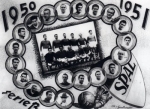 Dopo la lunga parentesi della guerra e della prigionia, ritornato a Ferrara, invece di dedicarmi allo studio legale di mio nonno e di mio padre, mossi i primi passi nel giornalismo come redattore del Corriere del Po, dove, fra l'altro, mi fu affidato l'incarico di seguire le partite interne della Spal. Eccomi, dunque, di nuovo in tribuna; più precisamente in tribuna-stampa, accanto ad Antonio Boari, neopresidente dell'Associazione Stampa, e a pochi metri da Paolo Mazza che proprio allora stava cominciando la sua mitica carriera di presidentissimo.
Dopo la lunga parentesi della guerra e della prigionia, ritornato a Ferrara, invece di dedicarmi allo studio legale di mio nonno e di mio padre, mossi i primi passi nel giornalismo come redattore del Corriere del Po, dove, fra l'altro, mi fu affidato l'incarico di seguire le partite interne della Spal. Eccomi, dunque, di nuovo in tribuna; più precisamente in tribuna-stampa, accanto ad Antonio Boari, neopresidente dell'Associazione Stampa, e a pochi metri da Paolo Mazza che proprio allora stava cominciando la sua mitica carriera di presidentissimo.
Come mi divertivo, la domenica sera, a scrivere quelle cronache! Le discese del tandem Pandolfini-De Lazzari, due mezze ali che avanzavano in parallelo, passandosi e ripassandosi la palla senza che gli avversali riuscissero a intervenire; le punizioni cannonata del centromediano Rancilio, in attesa delle quali i portieri balzellavano nevrotici, temendo il peggio; i dribbling ubriacanti di Pippo Belardini, uno studente della mia età che era stato mio compagno di scuola alle elementari.
Mettevo molto colore nei miei pezzi e questo non doveva piacere troppo a un tecnico esperto come Mazza che mi rimproverava anche una eccessiva generosità nei confronti degli avversari. La volta che definii «dubbio» un calcio di rigore concesso alla Spal in una partita contro il Pisa, si fece in quattro per dimostrarmi che quel rigore non soltanto c'era, ma era «sacrosanto».
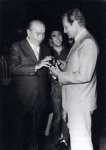 Non durò molto, quel mio lavoro al Corriere del Po; due anni dopo mi trasferii definitivamente a Milano e, da allora, anche a causa della mia attività di inviato giramondo, non potei più seguire le partite della Spal. Accadde, pertanto, l'assurdo: io che l'avevo vista in tante partite di serie B e C, non potei partecipare al lungo periodo d'oro (1951-1968) della serie A. In tutti quegli anni splendenti, avrò visto soltanto due o tre partite a San Siro, contro il Milan e l'Inter.
Non durò molto, quel mio lavoro al Corriere del Po; due anni dopo mi trasferii definitivamente a Milano e, da allora, anche a causa della mia attività di inviato giramondo, non potei più seguire le partite della Spal. Accadde, pertanto, l'assurdo: io che l'avevo vista in tante partite di serie B e C, non potei partecipare al lungo periodo d'oro (1951-1968) della serie A. In tutti quegli anni splendenti, avrò visto soltanto due o tre partite a San Siro, contro il Milan e l'Inter.
Di quella Spal ricordo, soprattutto, l'eccezionale intelligenza di gioco della mezzala, Fabio Capello - sì, proprio lui, il futuro fulcro della Nazionale Italiana, poi allenatore del Milan e del Real Madrid - e le geometrie perfette di Albertino Bigon.
Pare impossibile, ma si può dire che, con l'assenza dagli stadi, la mia attenzione e il mio interesse per la squadra ferrarese crebbero, addirittura: analizzavo le cronache delle partite; mi preoccupavo del rendimento dei giocatori; seguivo, anno per anno, le scoperte del mago Mazza che, con il suo fiuto straordinario, scovava sempre nuovi talenti, destinati, prima o poi, a passare a grandi squadre: Nesti, Bugatti, Cipollini all'Inter, Zaglio alla Roma; Malatrasi alla Fiorentina; Capello alla Juventus; Bigon al Foggia.
 Con il ritiro e la scomparsa di Paolo Mazza, arrivarono anni grigi, giù giù, fino al nero seppia della C2. Ma, per quanto attenuato, il mio interesse ha resistito. Ricordo il mio entusiasmo, qualche anno fa, per la vittoria sulla Solbiatese, che ci permise la risalita dalla C2 alla C1. Debbo ammettere che da diversi anni non ho più visto in faccia, e neppure in fotografia, i giocatori della Spal.
Con il ritiro e la scomparsa di Paolo Mazza, arrivarono anni grigi, giù giù, fino al nero seppia della C2. Ma, per quanto attenuato, il mio interesse ha resistito. Ricordo il mio entusiasmo, qualche anno fa, per la vittoria sulla Solbiatese, che ci permise la risalita dalla C2 alla C1. Debbo ammettere che da diversi anni non ho più visto in faccia, e neppure in fotografia, i giocatori della Spal.
Oggi, per esempio, conosco i nomi di Cancellato e di Pierobon, ma non so nulla del loro aspetto e del loro stile; eppure, ogni domenica, aspetto con ansia che Giampiero Galeazzi, con il suo gran faccione, mi annunci cosa ha combinato la Spal; e ogni lunedì compro la Gazzetta dello Sport soltanto per leggervi la cronaca della partita dei biancoazzurri.
«Ma perché ti interessi tanto a undici ragazzotti in mutande che corrono dietro a un pallone?» mi ha chiesto cento volte mia moglie. «Si può sapere perché vuoi vedere a tutti i costi Novantesimo Minuto?» mi domandano, di tanto in tanto, le mie figlie. Già, perché? Nostalgia della giovinezza? Attaccamento alla città natale? Amore delle geometrie tracciate da un pallone bianco su una distesa verde? Impulso maschile? Infantilismo?
Qualche volta, con le loro domande, i miei familiari riescono a farmi sentire quasi in colpa. Ma poi ripenso alle appassionate discussioni calcistiche che qualche anno fa, quando ero alla Mondadori, intrattenevo con un grande poeta come Vittorio Sereni, gran tifoso dell'Inter; o all'ultimo, lungo colloquio telefonico, tutto incentrato sul calcio e sulla Spal, che ebbi, poco prima della sua scomparsa, con quel grande letterato e amico che è stato Lanfranco Caretti. E allora mi consolo. Alé Alé, Spal!



